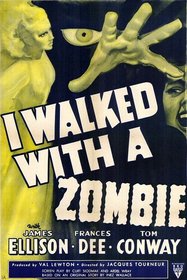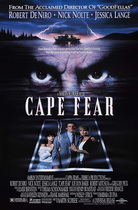Our editor-in-chief Nate Yapp is proud to have contributed to the new book Hidden Horror: A Celebration of 101 Underrated and Overlooked Fright Flicks, edited by Aaron Christensen. Another contributors include Anthony Timpone, B.J. Colangelo, Dave Alexander, Classic-Horror.com's own Robert C. Ring and John W. Bowen. Pick up a copy today from Amazon.com!
I Walked with a Zombie (1943)
Reportedly, I Walked With a Zombie was producer Val Lewton's favorite out of the nine low-budget horror films he produced for RKO Radio Pictures between 1942 and 1946. Disquieting, ethereal, and powered by shadow and suggestion, I Walked best displays the philosophy of terror that Lewton tried to imbue in all of his films. Perhaps it is this very fact that makes the film his least effective in terms of the horror genre, although it is a beautiful, admirable work in all other things.
Nurse Betsy Connell (Frances Dee) accepts a position caring for the invalid wife of Caribbean plantation owner Paul Holland (Tom Conway, always a welcome sight). Jessica Holland isn't dead, but she might as well be. She eats and breathes, but her willpower is completely gone and her eyes are fixed in an eternal trance. Connell becomes determined to cure Jessica, partially because she sees it as her duty, but also because she loves Paul and wants to express that love as selflessly as possible. When medicine fails, she begins to think that maybe the voodoo faith of the islanders may hold the answers. It does, but not the way that she thinks.
The issue with labeling I Walked With a Zombie as a horror film is that the characters never appear to be in any real danger, supernatural or otherwise. There's culture clashing, family politics, and an island romance of sorts, but none of these amount to a credible threat -- everybody's too well-intentioned for that. I Walked's relation to the genre appears to be mostly circumstantial -- Lewton believed it was a horror film and it does feature zombies. However, if it's a horror film, then you may as well chuck Alfred Hitchcock's similarly-themed Rebecca (1940) in with it. Rebecca at least had a concrete, deeply unnerving antagonist in Mrs. Danvers, whereas I Walked has nothing more terrifying than voodoo drums and an easily deterred zombie guard.
Put aside the horror connection, however, and you still have a good movie. It's the story of the deception of appearances. Nearly every major character appears one way initially and reveals a more complex, often contradictory nature as the plot progresses. The husband wants to save his wife despite the fact that he does not care for her. The jovial brother is wracked with bitter, impotent vitriol. The missionary mother moonlights as the voodoo god.
As with Cat People, Val Lewton and company present a story where superstition is compounded, not refuted, by logic. Medical science has explanations for Jessica's condition, yes, but none are completely satisfactory. Those patchy areas that voodoo and zombification rush to fill in and overcome are no less troubling. Though it is explained how the supernatural took Jessica's will, the tale is related by an unreliable party and it doesn't explain how medical science has consistently demonstrated her "life." In a sense, Jessica is a cinematic Schrodinger's cat -- she is both alive (although stripped of her will) and dead (although quite mobile for it), co-existing in both states at once until Lewton and company open up the tragic climax.
Director Jacques Tourneur, working with cinematographer J. Roy Hunt, paints a haunting picture, full of the glorious shadows that gave Lewton's horror films that noir vibe -- far more so than most producers were doing at the time. Watched on purely visual terms, I Walked With a Zombie gives a sense of unrest that the dialogue then processes into high-quality melodrama. With a slightly different script, this could have been a highly effective chiller.
Of course, that the script is to blame is a little ironic. Lewton, so often saddled with ridiculous requirements by RKO's front office, was here given Curt Siodmak, who penned a great number of Universal's monster movies, as a scribe. RKO must have been very excited, as Siodmak had been the pen behind Universal's highly lucrative The Wolf Man. Lewton, however, did not care for Universal's formula approach, and had Siodmak's draft rewritten by Ardel Wray (followed by his own rewrite, something he did for every one of his horror films). Siodmak's original concept involved more sinisterly intentioned Paul Holland character, one who made his own wife a zombie in order to keep her forever. Wray and Lewton in tandem removed this sinister element and found little else to replace it. 1
Still, as a haunting, slightly twisted melodrama, I Walked with a Zombie is on par with such classics as the aforementioned Rebecca and Robert Stevenson's Jane Eyre (1944) -- the latter is hardly surprising as Lewton himself stated that he had taken his inspiration for the plot from Brontë's original novel. Bearing in mind that the horror merely a flimsy pretext, I Walked with a Zombie makes for a dark, delicious treat from Hollywood's classic era.
1Bansak, Edmund G. Fearing the Dark: The Val Lewton Career. MacFarland & Company Inc., 1995. Pages 146-147.









movie soundtrack I WALKED
i am trying to determine is Sergio Mendes song Magalenha"" is somewhat of a "copy" (for lack of a better word) of the "Papa Legba" song in this 1943 movie. This movie had more atmosphere than any of the crap they throw together today.
What do you think? I am still trying to listen to the movie song on you tube, etc. to no avail. I could swear there is a really strong correlation.
Thanks
A Val Lewton fan NJ
I was pleasantly surprised by
I was pleasantly surprised by this film. Expecting a comic bookish version of voodoo, the script is one that offers respect of the tradition in its own right. Val lewton's curiosity about the complexity of human experience comes through once again. It's a pretty ambitious piece in that period.